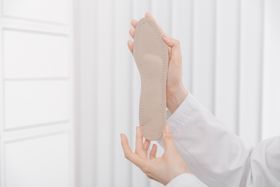Metatarsalgia vs Morton’s Neuroma: How to Tell the Difference
While both conditions have similar symptoms, you can differentiate Morton's neuroma and metatarsalgia based on the location and type of pain.
Updated January 26, 2025
Though a common occurrence, pain in the ball of the foot is still a nuisance, especially when the cause is unknown. Two of the most common causes of pain in the ball of the foot are metatarsalgia and Morton’s neuroma. Both conditions affect the metatarsal heads and are similar in presentation, making them hard to differentiate.
Let's learn how to distinguish between them and find the most effective treatment for your specific needs.
» Pain in the ball of your foot? Try Upstep's metatarsalgia custom orthotics
Morton’s Neuroma Pain vs. Metatarsalgia Pain
While it may be hard to differentiate between Morton’s neuroma and metatarsalgia pain, it is not impossible. Here are three areas to consider when trying to identify the real cause of your pain:
- Location of pain While Morton’s neuroma usually affects the tissue around the plantar digital nerve between the 3rd and 4th toes, metatarsalgia pain occurs under the balls of the feet beneath the 2nd and 3rd metatarsals.
- Type of pain Morton’s neuroma starts as a numbing and tingling sensation which worsens to become uncomfortable and painful. On the other hand, metatarsalgia often begins as a dull, aching pain that progresses to a sharp shooting pain.
- Clicking sensation More often than not, Morton's neuroma presents with a mass and a clicking sensation around the third and fourth metatarsals. There’s no such lump with metatarsalgia, though it may still feel like you're walking on marbles.
» Learn more about metatarsalgia symptoms, causes, treatments
When to Seek Treatment for Forefoot Pain
Whichever it is, the key to recovery is prompt intervention. Both conditions start small, but you shouldn't wait until the symptoms escalate before seeking medical attention.
The first line of action is to determine the cause of pain and the severity. Only then will it be possible to choose a treatment approach. You can expect this to include:
- Rest
- Activity modification
- Ice
- Non-steroidal anti-inflammatory drugs (NSAIDs)
- Exercise
- Massage
- Prescription of braces
- Splints
- Orthotics
Only when all these fail to bring improvement does surgery become an option.
» Need extra pain relief? Try these exercises and stretches for metatarsalgia
Preventing Pain, Promoting Mobility
Differentiating between Morton's neuroma and metatarsalgia is just the first step in your healing journey. Orthotics emerge as a fundamental treatment that addresses the root biomechanical challenges underlying conditions like Morton's neuroma and metatarsalgia.
Upstep's custom-designed inserts serve as more than cushioning—they're engineered to redistribute weight, reduce inflammatory responses, and systematically correct structural imbalances.
By providing individualized support that adapts to each patient's unique foot anatomy, orthotics can improve functional mobility, reduce pain intensity, and prevent potential long-term damage.
Disclaimer: The information on this blog is for educational purposes only and is not a substitute for professional medical advice.
Upstep does not provide medical diagnosis or treatment. While qualified healthcare professionals create our content, it's essential to consult with your healthcare provider for any foot or ankle concerns you may have.
Related Articles

Posterior Tibial Tendonitis: Symptoms, Causes, & Treatments
Babafemi Adebajo
February 17, 2023

Orthotics for Bunions: How Insoles Can Relieve Bunion Pain
Babafemi Adebajo
February 28, 2022

3 Insoles for Shin Splints: Our Expert Picks
Janik Sundstrom
December 17, 2024

Best Insoles For Sandals
Janik Sundstrom
September 22, 2025

Will Epsom Salt Help Blisters on Your Feet? What the Experts Say
Anjana Iyer
September 19, 2025
Related Posts
Babafemi Adebajo
Stabbing Pain in the Ball of Your Foot: What Is It?
Janik Sundstrom
Best Morton's Neuroma Orthotics
Babafemi Adebajo
Metatarsalgia: Causes for Swelling and 10 Ways to Reduce It
Babafemi Adebajo
Does Metatarsalgia Go Away and Can It Be Treated?
Janik Sundstrom




